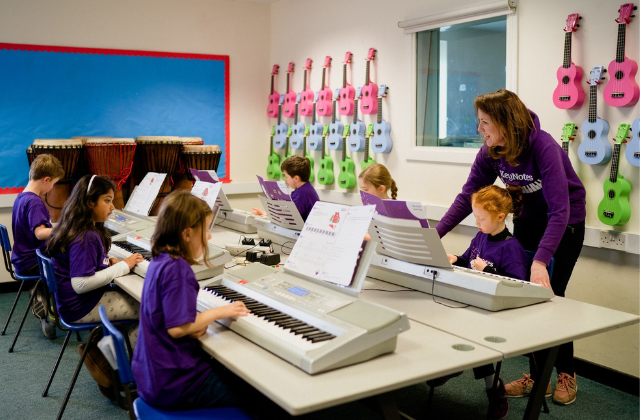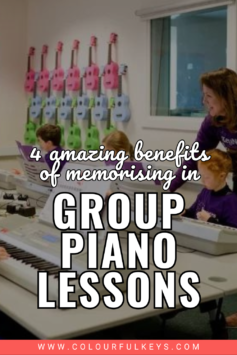
This article about memorisation in a group piano class was written by Melanie Bowes. Melanie is the Founder of KeyNotes Music, a group piano program, focusing on collaborative group learning in the foundation stages of piano. Having taught for many years as a school music teacher, Melanie brings all of her experience and knowledge together to help teachers deliver innovative and progressive group piano classes. Melanie is currently working towards a PhD in group piano teaching, researching the features that make it impactful and beneficial for children.
We’re all aware of the importance of memorisation when it comes to a professional solo musician’s performance, but would a 7-year-old see the same benefits in their playing if memorisation was a part of their learning process?
What about a whole group of 7-year-olds?

Through the process of memorisation, pianists gain a deeper understanding of their music. If we’re attempting to memorise a piece, we understand the overarching structure more fully, we quickly learn where ideas and motifs are developed or repeated and we use that understanding to give us landmarks and prompts when memorising.
When we’ve memorised a piece, we no longer need our eyes to process written information – making our listening more effective. And when listening more effectively, we produce a better sound.
These applications of memorisation in the learning process are relevant whether we’re teaching 1:1 or in groups.
But with group piano teaching, there are several further reasons why memorising music is important.
The Unique World of the Piano Ensemble
Playing in an ensemble, whether in unison or in parts, offers a unique opportunity for pianists to learn skills of musicianship often reserved for orchestras or bands.
Pianists in group classes need to have a heightened level of awareness as compared to playing on their own. Students must learn to be better musicians through listening, responding, playing with rhythmic accuracy and working cooperatively with others to make the best sound possible.
And when playing a harmony part within the ensemble, they need to develop an instinct for harmonic structures and changes.
Imagine trying to achieve all those things while keeping your eyes glued to the score!
The act of memorisation itself means you know the music, and you’re playing it well enough to be able to adapt and respond to others in the ensemble.
In a group setting, it’s about being so secure in your music that you can be flexible with how you play it and respond to the musicians around you.
In some ways, this makes memorisation even more important in group piano classes than it is in 1:1 lessons.
Memorisation Reason 1: Tempo, Fluency and Beat
Without a conductor, ensemble pianists need to be able to work together to set and keep the tempo and generally respond in terms of rhythmic fluency, which works best if we can see each other’s subtle movements.
This is why I like my pianists facing each other – being able to see each other, see movements, even see hands where possible.

The most common scenario in a group piano class is where the teacher plays along with students to help keep them together and keep the momentum going.
If you have students who are ready to lead, they can practise bringing students in without counting (e.g. taking an exaggerated breath, shoulders up) and indicating when fellow pianists should lift their hands off at the end of the piece through body language.
In both of these situations, students need to keep their eyes on the leader – not on the score. All too often, I see a piano ensemble play a piece beautifully and then completely butcher the end because all the players are so intently staring at their music instead of the leader.
Memorisation in group piano classes all but eliminates the possibility of that staggered ending to your performance.
Memorisation Reason 2: Collaborative Nuance
Another reason that our students need to be looking at each other, in group piano class, rather than at their music, is to collaborate on musical nuance.
Again, a volunteer leader can indicate dynamics, phrasing and general tone through their body movements and their own playing, and the rest of the class can imitate – but only if they are all watching and listening carefully.
Responding to the musical details as a group requires a heightened awareness of each other, not the score.
‘Creative Candies’ is a great way for students of any level to learn dynamics, articulation and expression. Enter your info below, and Nicola will send you a copy for free.

Subscribe to the newsletter and get the Creative Candies
Enter your details to subscribe to the newsletter for piano teachers with information, tips and offers.
I hate spam as much as you do! I will only send you emails related directly to piano teaching and you can unsubscribe at any time.
VMT members can download Creative Candies instantly without filling out the form above.
Not a member of VMT? Colourful Keys enjoys sharing these select freebies with its readers. If you want literally hundreds more resources like it (plus training courses, an exclusive teacher community, recommended repertoire, a training library and on and on and on!), you’ll love the Vibrant Music Teaching membership. Check it out today!
Memorisation Reason 3: The Joy of Making Music With Others
There is little doubt that students love to make music together.
The joy they experience when they’ve mastered a performance, having enjoyed the sound they were making, the piece they were playing and the fact that they got through it together, is unmatched within the context of learning music.
If each pianist is using their music throughout the performance, they are less connected – musically, physically, emotionally – as a group, which diminishes that feeling of elation.
With memorisation, however, a group piano class can really tune in to each other. The excitement of one student is contagious, and quickly spurs on the rest of the group until they’re all “on a high” from their performance.
Memorisation Reason 4: Fostering Independent Learners
Even when we’re teaching our students collaboratively, and they’re learning together, we’re still nurturing skills of independence in our group piano classes. Contrary to 1:1 lessons, we’re not “right there” or able to correct and guide at every micro step of the learning process.
And this is a good thing.
With memorisation as a part of the deliberate learning plan, students gain the tools they need to solve problems and practise on their own. We should be promoting these skills, just as they are nurtured and promoted in other areas of education.
When it comes to mastering a piece, not placing all our eggs in the “reading” basket will certainly help foster independence in our group piano students.

Does your group piano class learning process include strategies for memorisation?
Leave a comment to let us know. Then hop over to Nicola’s Planning Lessons hub page for more tips and tricks on teaching group piano classes.